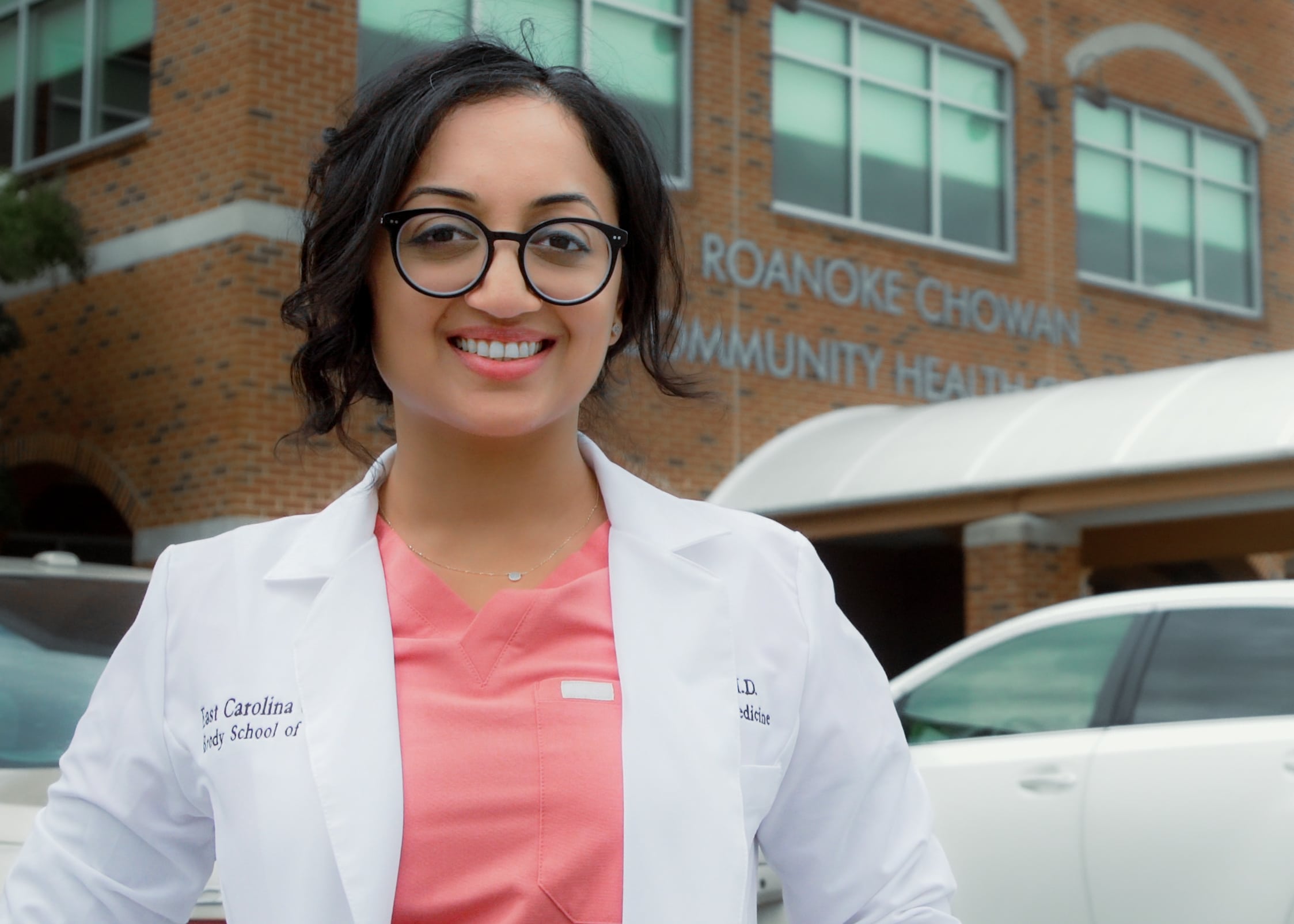Training the rural physicians of the future.
East Carolina University’s Brody School of Medicine and ECU Health launched a new Rural Family Medicine Residency Program in 2021 that equips physicians with specialized training in caring for patients in rural and underserved communities.
Below, hear and read about the program, its residents and why this work is so important in eastern North Carolina.
Their Story
We sat down with two graduates of the first class of the Rural Family Medicine Residency Program to learn more about their experience training in a rural community — and why they chose to stay in the communities in which they trained following their residency.
The Challenge
Americans who live in rural areas of the nation make up about 20% of the United States population, and they often experience shorter life expectancy, higher mortality, higher rates of poverty, fewer local doctors and greater distances to travel to see health care providers, compared to their urban and suburban counterparts.
Despite these communities representing nearly 20% of the U.S. population, only 10% of U.S. physicians practice in rural areas. ECU Health and Brody’s Rural Family Medicine Program aims to increase the number of physicians practicing in rural America, especially eastern North Carolina.
Studies show that family medicine residents who spent 50% or more of their training time in rural settings were at least five times more likely than residents with no rural training to practice in a rural setting. With this in mind, ECU Health leaders designed the program to bring more rural family medicine providers to eastern North Carolina.
The Program
The program is designed to give recent medical school graduates interested in serving as family medicine physicians in rural communities first-hand experience in caring for patients in the kind of under-resourced settings they plan to practice in upon completion of their residency training.
The residents spend a majority of their first year of training at ECU Health Medical Center in Greenville. They then spend the next two years training in either the rural Hertford County community of Ahoskie — at the Roanoke Chowan Community Health Center and ECU Health Roanoke-Chowan Hospital — in Duplin County at Goshen Medical Center in Beulaville and ECU Health Duplin Hospital in Kenansville — or in Roanoke Rapids at Rural Health Group Halifax Medical Specialists and ECU Health North Hospital.
The program exposes the residents to the breadth of family medicine — in both resource-abundant academic medical center environments and resource-scarce rural environments — so they are well-prepared to provide comprehensive care in a variety of practice settings.
While in the rural communities, the residents build connections with their patients and become integrated into the communities they serve.
Get to Know the Residents
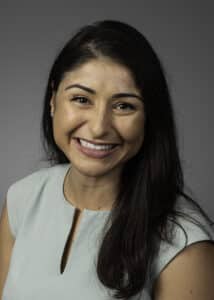 What is your name and background?
What is your name and background?
My name is Kimberly Biichle, and I was born in south Florida. I went to medical school at the American University of the Caribbean and completed training in Miami and Southeast Michigan.
Why did you choose the Rural Family Medicine Residency Program at ECU Health?
I myself grew up in a small rural agricultural community in Homestead, Florida which is nestled near the Everglades. This field addresses the needs that are most impactful.
What are some of the highlights of your experience in the Rural Family Medicine Residency Program?
Living in Beulaville, my heart has been filled as I develop deeper relationships with the local community – both inside and outside of work. As I grow to know our partnering medical community, it is uplifting to see us share similar goals and motivations.
What do you most enjoy about practicing in rural eastern North Carolina?
You can feel the sense of community in eastern North Carolina and directly feel the impact of service.
What would you say to someone considering applying for the program?
This is fertile ground to do so much good! Implementing evidence-based medicine with need for creativity regarding lack of resources is expected here. Come with a passion to serve, and I promise you will feel fulfilled.
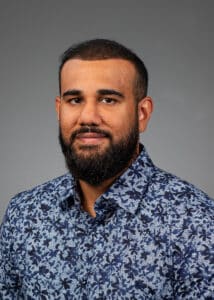 What is your name and background?
What is your name and background?
My name is Jaspaul Dhanota and I was born and raised in Ontario, Canada. I completed my undergraduate degree in Toronto and attended medical school at Aureus University School of Medicine in Aruba. My parents were born in India and I am a first generation Canadian-Indian.
Why did you choose the Rural Family Medicine Residency Program at ECU Health?
I chose ECU Rural Family Medicine Residency Program because rural/underserved medicine is important to me as my parents grew up in India where access to health care was limited. I also chose the rural program because the first year is spent at a large hospital with great resources followed by 2 years at a rural hospital. This provides residents with great training and experience.
What are some of the highlights of your experience in the Rural Family Medicine Residency Program?
Some of the highlights I’ve experienced in the rural family medicine program would the continuity clinic in Ahoskie. The staff, program coordinator, and attending are amazing to work with. I have been able to learn a lot during my time in the clinic and also investigate infectious disease with some specialists.
What do you most enjoy about practicing in rural eastern North Carolina?
I enjoy practicing in rural eastern NC because there is a large number of diseases and comorbidities to learn and experience from and the patient population is kind and very easy to talk to.
What would you say to someone considering applying for the program?
I would definitely recommend this program to anyone applying. The experience is unmatched, and the individuals involved in the program are amazing and have your best interests at heart.
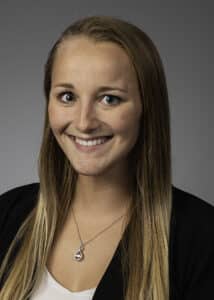 What is your name and background?
What is your name and background?
My name is Brooke Hunter and I grew up in Chillicothe, Missouri, but went to medical school in Fort Smith, Arkansas at Arkansas College of Osteopathic Medicine. I am a second-year resident at the ECU Rural Family Medicine Residency at Ahoskie.
Why did you choose the Rural Family Medicine Residency Program at ECU Health?
I grew up in a rural community and experienced the health care challenges that comes with being in a rural area first-hand. When I decided on becoming a doctor, there was no other option for me than to become a rural primary care doctor. The rural programs at ECU are exceptional at preparing doctors to be the best possible physician, especially those who would like to practice in a resource-limited setting. The first year of training is primarily spent in Greenville at the large medical center where you are exposed to many pathologies and can get a robust foundational knowledge. The second two years of training are spent applying that knowledge in a rural setting where sometimes YOU are the intensivist, nephrologist, cardiologist, and primary care provider for your patients!
What are some of the highlights of your experience in the Rural Family Medicine Residency Program?
One of my favorite experiences thus far is working with the migrant farm workers on Wednesday nights. We travel with the mobile health unit to surrounding areas and perform basic physical exams on patients who may not have seen a physician in many years. These patients are especially grateful for our work and it is an honor to provide care for them. We also provide food for the Ahoskie community with monthly food drives provided by our clinic.
What do you most enjoy about practicing in rural eastern North Carolina?
Serving the underserved. This phrase is often used when describing practices in rural areas, but it rings true in eastern North Carolina. Many of our patients have financial struggles, limited access to transportation, and/or limited options for health care. As physicians in our community, we are trusted by these individuals to provide top-notch care while understanding and accepting their personal challenges. This comes in the form of patient assistance programs and being a well-rounded physician able to manage patients’ chronic, complex conditions without the luxury of local specialists.
What would you say to someone considering applying for the program?
Residency is tough, no matter what program you go to. Our program is no different; it will challenge you in ways you didn’t think were possible. However, every day you train here you become a stronger, more capable physician. Training in this environment surrounded by my colleagues and mentors has been a humbling experience that I would not trade for anything!
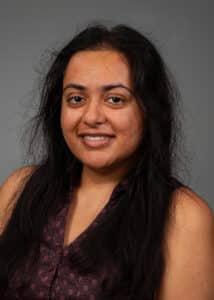 What is your name and background?
What is your name and background?
My name is Rachna Patel, and I am from Toronto, Canada. I went to school at Ross University School of Medicine located in the Caribbean on an island called Barbados. I love art and have had my artwork placed in a museum.
Why did you choose the Rural Family Medicine Residency Program at ECU Health?
I chose the Rural Family Medicine Residency Program because I felt the most at home with my interviewers. I did most of my rotations in major cities where hospitals were close, but rural medicine is different. This hospital serves almost half of North Carolina, and people come from distances to be seen here. You practice medicine in a setting where you use what resources you have to help your patients. This hospital is situated in an area that covers over half of North Carolina, and we go to smaller towns and provide care for people. By going to rural places you are bringing medicine to patients rather than patients bringing themselves to medicine.
What are some of the highlights of your experience in the Rural Family Medicine Residency Program?
I have patients in the clinic specifically ask for me, and this happens quite often. People build bonds with you, and they become close to you. There is a higher level of connection of doctor to patient in rural settings because you are the only provider there, and this helps to bridge that gap in health care.
What do you most enjoy about practicing in rural eastern North Carolina?
The thing I enjoy the most about practicing in rural eastern North Carolina is the individuals. The people are nice and they engage well with doctors. They are interested in learning and they are appreciative of any help they get.
What would you say to someone considering applying for the program?
This is a great program. We do so much at this facility to give back. We cover high school sports as doctors, we have a clinic where we bring medicine to people who work in farms and we provided them with all the benefits of health care without having to create the time to go to a facility. Through this, you are breaking that barrier of having to make time for an appointment and getting to be seen by a provider.
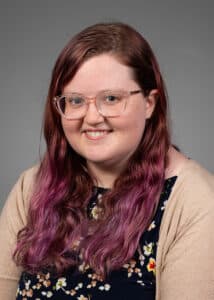 What is your name and background?
What is your name and background?
My name is Margaret Pearce, and I am from Cary, N.C. I went to Western Carolina University for my undergraduate, and I went to Sidney Kimmel Medical College for medical school. I also have a Master’s in Public Health from Thomas Jefferson University.
Why did you choose the Rural Family Medicine Residency Program at ECU Health?
I wanted to learn how to do the best patient care possible with limited resources available. At the Rural Family Medicine Residency Program at ECU Health, I get the best of both sides of medicine – rural medicine and treating high-acuity patients at the Medical Center in Greenville.
What are some of the highlights of your experience in the Rural Family Medicine Residency Program?
I’ve enjoyed time at our clinic in Duplin and getting to know everyone.
What do you most enjoy about practicing in rural eastern North Carolina?
Eastern North Carolina is a close-knit community where everyone knows everyone.
What would you say to someone considering applying for the program?
The match is hard, and residency is hard. At this program, you’ll have many opportunities, and the clinic is so much fun.
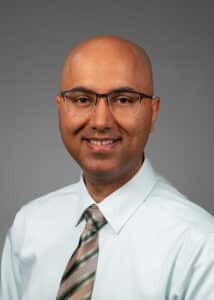 What is your name and background?
What is your name and background?
My name is Kanwar Sandhu. I grew up in Canada, did my undergraduate from University of British Columbia, and received my Doctorate in Medicine from Ross University School of Medicine.
Why did you choose the Rural Family Medicine Residency Program at ECU Health?
The Rural Family Medicine Residency Program at ECU Health is modeled after the standard ECU Family Medicine program, which is undoubtedly one of the best in the country. Furthermore, during my interactions with the Rural Family Residency Program leadership, I was very impressed with their commitment to the resident education. And my experience thus far as a resident physician has been nothing short of stupendous. Each day I am encouraged by my mentors to take leadership of my patients in an environment that is conducive to learning and growth.
What are some of the highlights of your experience in the Rural Family Medicine Residency Program?
What attracted me the most to Rural Family Medicine at ECU was the kindness, humility, warmth, and hospitality of the people of eastern North Carolina. The best part of my day is meeting these people every day! But to help them with their diverse and complicated medical problems is a privilege and an honor. I become a better human and physician with each interaction with my patients.
What do you most enjoy about practicing in rural eastern North Carolina?
Serving some of the most endearing people in rural eastern North Carolina is the best part of my day, every day! In addition, due to limited access to primary care in eastern North Carolina, the complexity of patients can be impressive. However, complex medical problems allow for a wide variety of interdisciplinary team interactions, which fosters great learning and growth.
What would you say to someone considering applying for the program?
If your passion is to serve underserved, underprivileged populations of the USA, then eastern North Carolina is the place to be! The Rural Family Medicine Program at ECU is spearheaded by some of the most remarkable humans and physicians you will ever come across, and their leadership is second to none.

